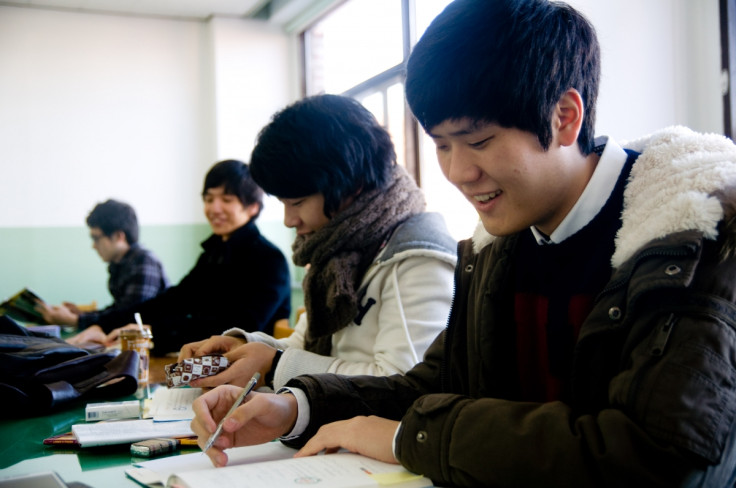South Korean President Enters Cultural Minefield in Efforts to Reduce Working Hours

Living and working overseas will always throw up sides to your host nation's culture that you love and hate, and others which you find just baffling.
Such was the case with the time I spent working as a teacher and journalist in South Korea a few years back.
It is a land of paradox: you could ride the fastest train on earth and surf the most rapid internet imaginable, but I was warned against drinking the water, while the lack of women in roles at the upper echelons of the country's chaebol (conglomerates) was startling.
As a teacher, I got to see first-hand the education system which is the envy of the rest of the world. But I also bore witness to its dark underbelly: children, exhausted through overwork, devoid of charisma, concerned with grades at the expense of creativity.
An employee of a hagwon (a private, after-school academy), I would give English lessons to tired children until after 10pm. The later in the evening, the more exhausted the students, since before my class, they attended additional classes in maths, science, music and Korean, with very little free time.
As the kids graduated middle school and made their way to high school, their schedules became more gruelling. Those who were to be packed off to boarding school spoke with a sense of trepidation about what lay ahead. They would be rising before 6am for taekwondo lessons, attend lessons until the evening, followed by hours in the study hall working on homework and revision, before seeing their beds by midnight.
Having been schooled in the system of Northern Ireland, regarded as one of the best in Europe, I struggled to relate to and was at times critical of the Korean model, but the results speak for themselves. South Korea's education system is commonly referred to as the best in the world.
An annual report by education and publishing company Pearson has consistently used data measuring cognitive skills and education attainment to confirm the view, with South Korea coming ahead of Japan, Singapore, Hong Kong and Finland in the latest edition.
"Our children spend over a month less in school than children in South Korea every year. That's no way to prepare them for a 21st century economy," said US President Barack Obama recently.
Education is competitive in South Korea, and the trend of long-running days is obviously something that comes from the top-down and is reflected in the working week expected of adults.
OECD statistics from 2012 (the latest available) showed that South Koreans work more hours per year than any other member state, on 2.193, compared with 1.647 in the UK and 1.408 in Germany.
It's a practice which has clearly had some measure of success: the country's economic revolution has been largely based on thriving exports, with innovative chaebol such as Samsung, LG and Hyundai proving to be some of the most flexible companies in the world.
Recent developments, then, could prove to be some of the most challenging for South Korean society for 50 years, as the government in Seoul readdresses the working week.
Reinventing the Wheel?
The FT reports that President Park Guen-hye is keen to reduce the maximum working week from 68 hours to 52, in a bid to increase employment from 65% to 70% over the next three years.
Currently Koreans can work a statutory week of 40 hours, but can also work an additional 12 hours overtime and 16 hours on weekends. The move to change the legislation faces opposition from households and trade unions representing the dominant export sectors.
Geun-hye's decision may be validated by the fact that despite working long hours, Korean per-hour productivity lags behind rival economies and is just 66% of its OECD peers.
It also begs the question: if the working week is too long, then what about the school week?
Ratings agency Moody's warned recently that Korea's indebtedness is dampening growth. It could be argued that Guen-hye's support of employment reform comes at a strange time and may therefore face opposition getting over the line. But whatever way you look at it, she is caught between a rock and a hard place.
One of my main takeaways on Korea culture was the pride people there place in hard work and the long working day. For many, taking it easy isn't an option as there is pressure from within families to be successful at work, at home and in school.
For some, the pressure can be crippling. Forty Koreans commit suicide every day, an OECD-table topping statistic which is less envied elsewhere in the world.
If Korean policymakers can find a way to make the working week shorter while boosting employment, to continue to produce excellent students but tackle the dangers that come with long schooling hours, all the while tackling indebtedness and the national disgrace that is the rate of suicide they'll have performed one hell of a balancing act.
But something needs to be done on all of these fronts. Geun-hye may have statistical aims, but is entering a cultural minefield, in a country which is in some ways walking before it can run.
© Copyright IBTimes 2024. All rights reserved.






